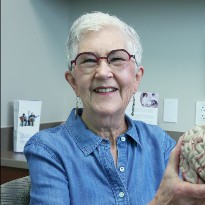Using Ultrasound to Treat Essential Tremor
Lair saw a neurologist in College Station and was diagnosed with essential tremor, a neurological condition believed to be caused by disruption of signals that control movement in the brain.
Mischer Neuroscience Institute, a collaboration between Memorial Hermann-Texas Medical Center and McGovern Medical School at UTHealth Houston, is the largest and most comprehensive neuroscience program in Southeast Texas. Our affiliated team of nationally and internationally recognized clinicians, researchers and educators is discovering new ways to innovate the field of neuroscience and the care we deliver.
As one of the first institutions in the nation with a fully integrated neuroscience program, we are making advances across the full continuum of care, including neurology, neurosurgery, neuroradiology, neurorehabilitation and pain management. The Institute diagnoses and treats brain tumors, cerebrovascular disease, pediatric neurological disorders, epilepsy, movement disorders and neurogenerative diseases, neurocognitive disorders, multiple sclerosis, neuromuscular diseases, spine and neurotrauma. We are also a national leader in stroke treatment and have received Comprehensive Stroke Center accreditation that indicates we deliver the highest level of stroke care.
Patients come to the Institute from around the world for leading-edge care for both rare and common diseases of the brain and spinal cord. The Institute currently performs more neurosurgery procedures than any other hospital in the Texas Medical Center. Each year, we treat more than 5,000 surgical patients and perform more than 400 brain-tumor operations, 250 functional neurosurgical procedures and 1,000 spinal operations.
Our affiliated specialists provide leading-edge care for the following neurological conditions:
According to the Centers for Disease Control (CDC), more than 795,000 people in the United States suffer from stroke each year, which means someone has a stroke every 40 seconds. Accessing the best possible care, quickly, can have a significant impact on stroke outcome and recovery.
We are accredited as a Comprehensive Stroke Center (Level I) by both The Joint Commission and the American Heart Association/American Stroke Association. This highest designation for stroke certification is reserved for hospitals that participate in patient-centered research and have the capabilities to treat the most complex stroke cases
The Institute offers acute stroke treatment with IV thrombolytic, endovascular therapies such as intra-arterial thrombectomy, carotid stenting and endarterectomy, diagnostic cerebral angiogram, aneurysm clipping and coiling, pipeline stents and embolization for vascular lesions, and surgical options including craniotomies for clot evacuation.
As a Comprehensive Stroke Center (CSC), Memorial Hermann-Texas Medical Center has undergone rigorous surveys during which stroke specialists reviewed the hospital’s compliance with stringent CSC standards and requirements including, but not limited to, publicly shared stroke outcomes.
In 2024, there was one stroke complication among all patients undergoing carotid artery stent placement (procedure that restores normal blood flow through the arteries that carry blood to your brain that may be blocked due to a build-up of fatty deposits/plaque).
2024 Carotid Artery Stent Volume and Complication* |
|||
| Volume | Stroke Complications | Complication Rate | |
| Symptomatic | 24 | 1 | 4.2% |
| Asymptomatic | 12 | 0 | 0% |
As one of the leading CSCs in the Greater Houston Metropolitan Area, Memorial Hermann – Texas Medical Center also performs high volume treatment for subarachnoid hemorrhage caused by aneurysmal ruptures. Our world-renowned neurosurgeons and endovascular physicians perform aneurysmal coiling and clipping 24/7, 365 days.
In 2024, a total of 130 coiling and clipping procedures were performed, with one mortality occurrence.
2024 Aneurysm Clipping and Coiling Volume and Complication* |
|||
| Volume | Mortality Complications | Complication Rate | |
| Aneurysm Coiling | 63 | 1 | 1.6% |
| Aneurysm Clipping | 67 | 0 | 0% |
*Complications include stroke and death.
We provide stroke education for both patients and families, through printed materials and interactive support-group sessions. Our support group is facilitated by a clinician who specializes in stroke care. Stroke survivors, family members and caregivers the opportunity to learn about life after stroke, including ways to address the mental-health and emotional needs they may encounter.
The support group meets virtually on the first Tuesday of each month from 10:30 to 11:30 a.m. Patients and families can register online, or by calling (713) 222-CARE (2273).
The Texas Comprehensive Epilepsy Program at Memorial Hermann-TMC is an accredited Level 4 epilepsy center, the highest designation from the National Association of Epilepsy Centers (NAEC). Level 4 accreditation is reserved for epilepsy programs with the advanced capabilities and facilities needed for medical and surgical evaluation and treatment of patients with complex epilepsy.
Our inpatient neuroscience center can accommodate a range of patient needs, with facilities including 32 neuroscience intensive care unit (NSICU) beds, 10 neurovascular intensive care unit (NVICU) beds, 15 neuro-specific intermediate medical unit (IMU) beds and seven epilepsy monitoring unit (EMU) beds.
Magnetoencephalography (MEG) is a noninvasive diagnostic process for evaluating epilepsy and other neurological conditions by locating abnormalities inside the brain. This advanced technology maps brain function, through electrodes attached to the head, and pinpoints the precise source of seizure activity. With this important information, physicians can create a targeted treatment plan aimed directly at the identified area of the brain.
MEG testing is a helpful tool for some patients with drug-resistant epilepsy and who are potential candidates for neurosurgical or neuro-modulatory intervention. When brain surgery is necessary, MEG testing provides a precise map of the brain, enabling specialists to plot optimal surgical paths that avoid critical sensory, motor or language-specific cortexes.
Memorial Hermann brought the first magnetoencephalography (MEG) to Houston in 1996, and it is one of the longest, uninterrupted operating MEG centers in the country. Our center is one of only a few in the nation, and patients come from around the world for this highly specialized care.


It is an honor to be recognized for our efforts in the 2025-2026 U.S. News & World Report’s Best Hospital rankings
Learn MoreMischer Neuroscience Institute at Memorial Hermann-Texas Medical Center
6411 Fannin Street
Houston, TX 77030
713.704.4000
More on the Mischer Neuroscience Institute at Memorial Hermann-TMC

Lair saw a neurologist in College Station and was diagnosed with essential tremor, a neurological condition believed to be caused by disruption of signals that control movement in the brain.

After years of uncontrolled seizure activity, Christopher Borck resigned himself to a life of isolation. Epilepsy prevented the otherwise healthy young man from doing everyday things like driving a car and living independently. Even though he was taking seizure-control medication, his seizures...